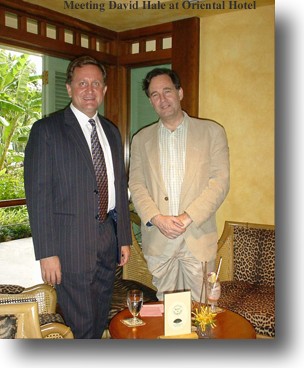Economic Consequences of The Iraq War.
Economic Consequences of The Iraq War. Here is another article by Mr. David Hale, one of the world's top quoted global economist and a regular contributor to thaistocks.com The Economic Consequences of The Iraq War. By David Hale, Chicago USA.
There is little doubt that America's war with Iraq will be the dominant event shaping the world economy and financial markets during the next few weeks and months.
A country with a GDP comparable to Louisiana's has brought the world to a standstill. The paralysis will not be resolved until the U.S. completes a regime change in Baghdad.
The prospect of war between America and Iraq has already had several economic consequences. The price of oil rose to $40 per barrel or the highest level in several years. All the major recessions since 1974-1975 have been preceded by oil price shocks. At the time of the first oil shock in 1973-1974, energy consumption was equal to about 6.2% of GDP.
During the late 1970's, it rose to 7-8% of GDP and then spiked to nearly 11% after the oil price shocks of 1979-1980 (the Iranian revolution). The energy consumption share of GDP plummeted during the 1980's back to 6-7% of GDP and troughed at 5% of GDP during 1998-1999 (when oil prices fell to $10 per barrel). The recent oil price shock increased inflation sharply during the first quarter and threatened to push the energy consumption share of GDP back to 7%. But as the oil price fell nearly $10 per barrel at the start of the conflict, inflation should decline during the next few months and boost consumer spending this summer.
If the first quarter of 1991, the U.S. economy benefited from the fact that everyone perceived America had won a clear and decisive victory. The clarity of the outcome had an immediately beneficial impact on oil prices, stock market prices, and consumer confidence.
The impact of victory this time could be less clear-cut. There will be concerns about the danger of new terrorist attacks. The war has produced great divisions in the western alliance which might have spillover effect on other areas of policy such as trade while undermining Britain's attempts to play a leadership role in Europe. The U.S. is occupying Iraq, not liberating Kuwait, so it will have to assume the cost of a potentially long military presence there.
The financial markets are concerned about American unilateralism because they perceive it as opening the door to a new age of imperialism which could have significant economic consequences. After a great peace dividend following the end of the cold war, American defense spending is now increasing dramatically. The upsurge of the defense budget will magnify the federal deficit and increase the risk of the current account deficit expanding further. During the cold war, American allies often helped to shoulder the burden of American military spending Germany had a formal offset program in which it engaged in financial transactions, such as stockpiling dollars at the Bundesbank, to offset the cost of U.S. defense spending.
 During the Gulf War of 1991, the U.S. received huge subsidies from Japan, Germany, the Gulf States, and Saudi Arabia to pay for the cost of evicting Saddam Hussein from Kuwait. The U.S. will receive no subsidies to pay for the coming war. If the occupation meets great resistance and proves to be expensive, the U.S. will also have to assume all of the costs. The markets would regard such a development as negative because of the potential consequences for the budget deficit. In fact, Congress would probably respond to a high cost war by vetoing the Bush tax cut proposals which were designed to bolster the equity market.
During the Gulf War of 1991, the U.S. received huge subsidies from Japan, Germany, the Gulf States, and Saudi Arabia to pay for the cost of evicting Saddam Hussein from Kuwait. The U.S. will receive no subsidies to pay for the coming war. If the occupation meets great resistance and proves to be expensive, the U.S. will also have to assume all of the costs. The markets would regard such a development as negative because of the potential consequences for the budget deficit. In fact, Congress would probably respond to a high cost war by vetoing the Bush tax cut proposals which were designed to bolster the equity market.
In recent congressional testimony, Alan Greenspan has suggested that geo-political uncertainties have been the major cause of the U.S. economy's recent weakness. But there are several other factors which have also played a role. During the past three years, the U.S. stock market has declined by an amount equal to 90% of GDP compared to 60% after 1929. The Sarbanes-Oxley legislation enacted by Congress last summer has made many corporate managements highly risk averse. They fear that any errors could open themselves up to both SEC intervention and litigation by tort lawyers. The economy enjoyed 3% growth during 2002 as a result of extraordinary monetary and fiscal stimulus. The Fed slashed interest rates to 1.75%. Households benefited from the tax cuts enacted during May 2001. Spending on defense and homeland security coupled with tax cuts, turned a budget surplus equal to 2% of GDP into a deficit now approaching 3% of GDP, If policy becomes less simulative, there is a risk that consumer spending could slow before investment spending revives. As a result of the economy's vulnerabilities, the impact of the war on U.S. fiscal policy could become an important factor determining the outlook for both 2003 and 2004. If Congress fails to enact the Bush fiscal stimulus because of concern about rising defense spending, the economy could fail to rebound as decisively as the financial markets are now anticipating.
The recovery from the 1991 Gulf War was very disappointing because of a crisis in the U.S. banking system resulting from an upsurge of non-performing real estate loans. They were nearly 500 bank failures during 1989-1991 compared to only 11 during 2001 and 2002. Government regulatory agencies intervened aggressively and helped to produce a severe credit crunch which rendered monetary policy impotent. The U.S. banking system is far healthier today than it was twelve years ago but the caution resulting from equity market losses and corporate scandals could still inhibit the economy's upturn during the next three or four quarters if fiscal policy turns neutral.
The Bush administration has not appointed an ambassador for burden sharing, as did the first Bush administration during the early 1990's. But at some point there is bound to be renewed debate about how to pay for the cost of America's new international role. The American people have supported the Iraq war because of the events of Sept. 11th. But it is far from clear that they will be prepared to support a prolonged military presence in Iraq if they perceive it to be expensive. The fact is neither the American people nor the American government are psychologically prepared to play a colonial role in the third world. Until 2003, the international affairs budget of the U.S. government had been in decline for many years. Organizations such as the C.I.A. have found it difficult to recruit the best the brightest from the country's elite universities for over a generation. The Congress turned protectionarist after the Cold War ended. The U.S. has a tradition of anti-imperialism which helped to set the stage for the Iraq war by promoting the rapid liquidation of the British Empire after World War Two.
The central banks most likely play a burden-sharing role financing the U.S. current account deficit during the next few years are in East Asia. Japan, China, and other Asian countries do not want their currencies to appreciate sharply against the dollar. Japan intervened heavily last year and during early 2003 to restrain the yen. The odds are high that its forex reserves will expand to $500 billion during the next twelve months as a result of new dollar support operations. As the U.S. current account deficit is likely to exceed $400 billion for at least three or four years, it is not difficult to imagine Japan having forex reserves in excess of one trillion dollars by 2010. China is also determined to maintain a stable exchange rate despite a healthy current account surplus and rapid growth of foreign direct investment. This stability policy could push China's forex reserves over $400 billion by 2005.
There is little doubt that the U.S. will conquer Iraq and drive Saddam Hussein from power. But America's decision to act unilaterally has set in motion political shock waves which will not be fully comprehensible for some time. The markets will rally on positive news about the military conflict. But the sustainability of the rally will hinge upon how America reconciles its new imperial ambitions with the realities of large fiscal deficits and unprecedented current account deficits. The war will bolster the President's popularity but its cost could put his fiscal strategy at risk. What remains to be seen is what additional sacrifices America will have to make in order to support its new imperial responsibilities.
 By David Hale. dhale@davidhaleonline.com
By David Hale. dhale@davidhaleonline.com
The views and opinions expressed this article are his own and not necessarily those of Paul Renaud and thaistocks.com. We thank Mr. David Hale for this quality contribution and wish best regards to all our many viewers.
Paul A. Renaud.

